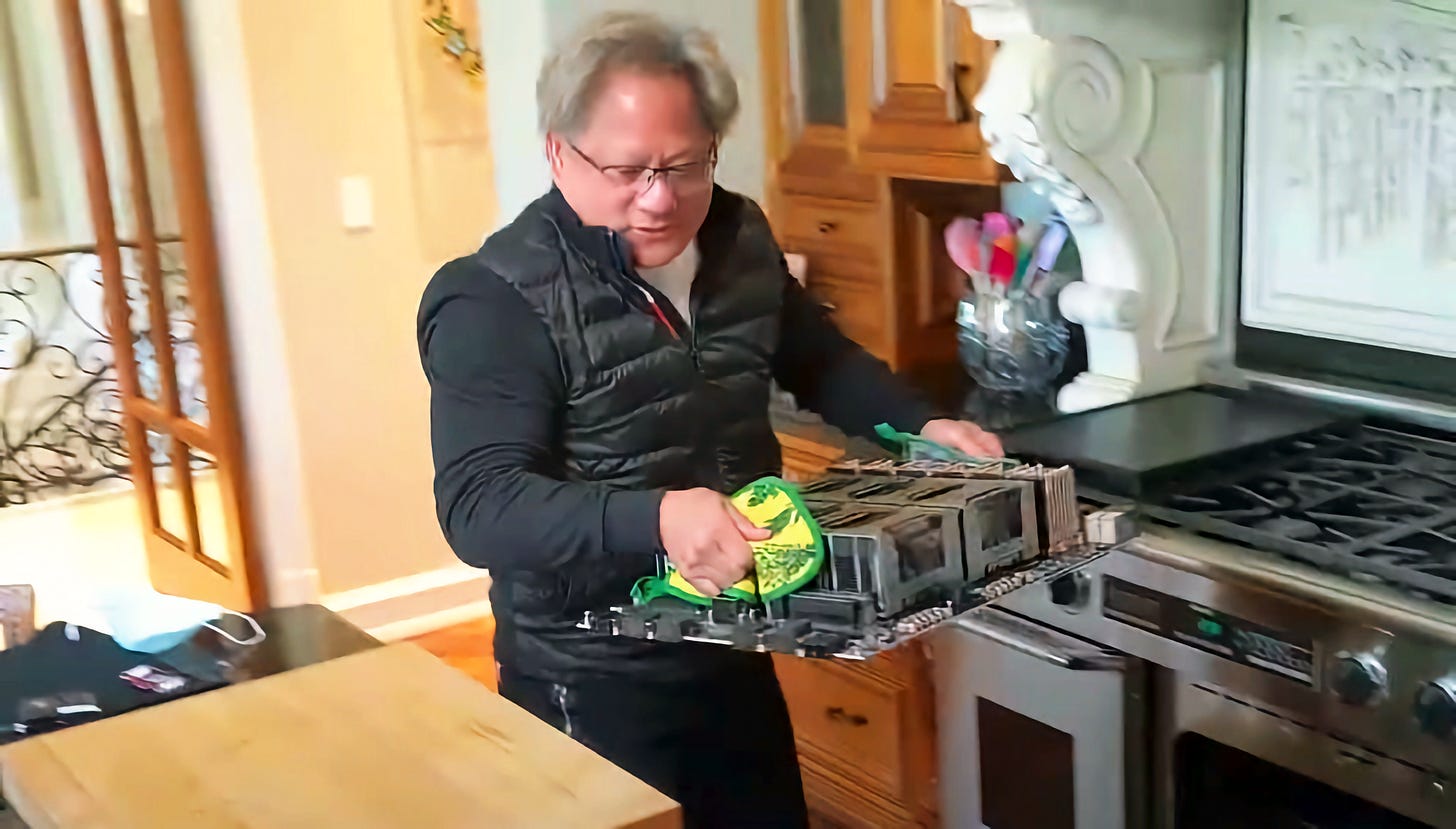447: Nvidia vs Hyperscalers, TSMC, Tech IPOs, SpaceX & Starlink, $5bn for Old Songs, ChatGPT vs 17 Doctors, and Phoebe Waller-Bridge
"it’s a constellation of abilities that all interact"
There are plenty of difficult obstacles in your path. Don't allow yourself to become one of them.
–Ralph Marston
🎉🎂📝 Congrats to friend-of-the-show Fredrik Gieschen (🇩🇪🇺🇸) on 3 years of writing his recently-renamed newsletter Neckar’s Alchemy of Money.
To commemorate the milestone, he wrote a very good piece about his experience. I want to share some highlights with you (but it’s worth reading the whole thing):
to me, writing is about so much more than earning a living. It shifts your mindset from that of a consumer to that of a creator.
It reminds me of what I wrote about how having a creative outlet is a bit like walking around with a camera around your neck. It makes you look at everything differently — having a platform for your ideas will make your brain generate more of them.
Everyone needs at least one creative outlet in their lives. We spend most of our days consuming what others have made, whether it’s reading, watching, or listening.
I believe it’s crucial that you cultivate at least one place in which you truly express yourself. Forget about sharing and forget about money. Just find one creative activity that you enjoy and that allows you to express and reflect on your unique experience of life. I don’t know what suits you best. For me, it has been mainly writing.
Frederik also makes a strong case for just how hard it is to make a living from writing online:
As a writer, you compete for attention with the world’s best-engineered addiction machines. I’m talking about TikTok, Netflix, YouTube, video games, even good old TV. And you’re supposed to engage your readers with just… words?
So true!
That’s why I greatly admire those who can pull it off — it usually takes years of grinding and terrible writing to get any good, and it requires learning all kinds of skills because “being good at writing” is not just one skill, it’s a constellation of abilities that all interact and that must somehow gel well enough together to produce something that won’t make people hit the ‘back’ button on their browser in 200 milliseconds.
That’s rare!
Media has always been ruled by power laws (like most other things):
What’s different today is that thanks to the internet, all kinds of new permissionless paths are available. The absolute number of people who can enter the fray is MUCH higher.
And the peaks are higher because global distribution is now a given, so if you hit it big, you can go from creating something in your bedroom to being known around the world without any gatekeeper’s blessing.
But this explosion of creativity 💥 doesn’t mean that, on an individual basis, it isn’t *extremely* difficult to stand out and succeed.
If it’s so hard and such a long shot, why do it at all?
You do it because earning more money would be nice, but continuing to write feels important. You do it because not doing it seems inconceivable.
You do it because you don’t know where it will lead and because you can’t know unless you keep doing it.
You do it because you feel you have to, because you can’t help yourself. Because you need to keep going to, hopefully, one day arrive at great work.
In the words of Bukowski, don’t write professionally unless it comes “bursting out of you in spite of everything.”
🎆 Intrinsic motivation! 🎆
I have no doubt that in 3 years, Frederik will have kept growing as a writer and as a person. I, for one, am very much looking forward to following him on that journey!
💉💊👩🏻⚕️ Where are we in the GLP-1 hype cycle? 🤔
I can't help but think that at some point, we'll learn about some undesirable side effects of these drugs.
If I had to guess, based on reports from people saying they help with all kinds of addictive behaviors (gambling, shopping, etc), there are some neurological effects on reward-seeking behaviors that may take a while to fully reveal themselves. (unless it’s all placebo, which is also a possibility)
But if this is the case, the molecules cannot differentiate between socially/personally desirable and undesirable effects. So I’m guessing we're likely to have some great musicians who find out they don't feel like practicing their instruments all the time anymore, or successful entrepreneurs who find that their drive to build is reduced, or something of the sort…
Don’t get me wrong, I don’t want to imply that they aren't a great invention, won’t be blockbusters financially, or that even with some negative side-effects they can’t have a largely positive net effect.
I’m just saying that like most things, they’re probably nuanced and complex, and I’m very curious about what we’ll learn over time.
🛀💭📺 I wonder how big is total storage for all of Netflix’s video assets.
I don’t mean count every copy in every CDN around the world, I’m wondering how big is *one* copy of the whole library of content, including every digital master, every encoded version for various bitrates, etc.
🏦 💰 Liberty Capital 💳 💴
😎 Nvidia’s Gambit to Go Direct to Customers and Commoditize Hyperscalers 🔪 🐜
I missed so much Nvidia stuff while I was on vacation, I’m not sure if I should go back and dig into it or just move on…
But here’s something I want to mention about Nvidia’s efforts to grow its own cloud services (basically leasing some of its hardware and software hosted inside of other people’s clouds, but branded as Nvidia DGX Cloud):
Last year, Nvidia made an unusual proposal to Amazon Web Services and other cloud providers that have long been the biggest buyers of Nvidia’s specialized artificial intelligence server chips. Nvidia wanted to lease Nvidia-powered servers in the cloud providers’ data centers so it could turn around and rent the same servers to AI software developers. [...]
Nvidia saw a way to essentially compete with the cloud providers for customers. Nvidia’s trump card? It was about to release a much anticipated new AI chip, the H100, which the traditional cloud providers needed.
Microsoft, Google and Oracle agreed to Nvidia’s proposal but AWS did not
They’re leveraging the scarce supply of H100s to get concessions and better terms for their own services, with the goal of building more direct relationships with customers.
I wouldn’t want to sit across from Jensen at the negotiating table right now — though remember that things change fast and he was writing off A100 inventory just last year.
Meanwhile, the hyperscalers are fighting back.
Google is farthest along with its homegrown TPU (now on version 5), but AWS also has its own customer chips for AI model training and inference (not nearly as good, but cheap), and Microsoft can’t be too far behind.
As I previously wrote, Nvidia is also trying to help keep its customers more fragmented by helping new cloud entrants specialized in AI/GPU compute grow:
Nvidia has taken other steps to try to weaken the traditional cloud providers: propping up their competitors. It has given a precious allotment of H100 GPU chips to upstart cloud firms that specialize in renting GPU cloud servers, including CoreWeave, Lambda Labs and Crusoe Energy, which grew quickly while the legacy cloud firms struggled to get their own new H100 servers up and running.
It’s a real knife fight out there when it comes to accelerated computing!
Can Nvidia maintain dominance and margins? Is it just a question of time until their moat erodes on the software and hardware side now that the whole world is focused on the thing that Nvidia used to be alone fiddling with 5-10 years ago?
I don’t know, but it’s going to be exciting to watch unfold!
🇺🇸✈️🇹🇼 Chips produced at TSMC’s Arizona plant will still need to be shipped to Taiwan for packaging 🐜 🤦♀️
This is kind of an important detail!






